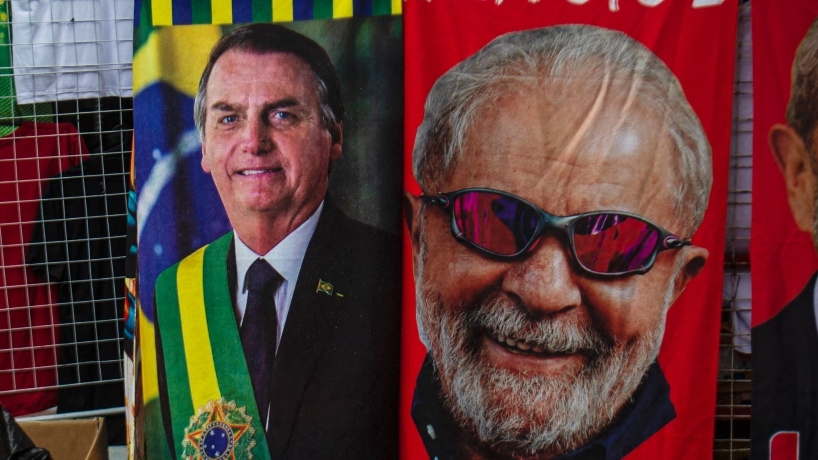Brazil elections: What is at stake for Israel and Palestine?

This Sunday, Brazil is set to hold the first round of a presidential election that will be the culmination of a battle between two ideological polar opposites, and the results will hold tremendous consequences for the future of Latin America's most populous country.
Incumbent Jair Bolsonaro, a right-wing nationalist and former paratrooper, is facing a serious challenge from former president Luiz Inacio Lula da Silva, one of the country's most revered leftists.
Stay informed with MEE's newsletters
Sign up to get the latest alerts, insights and analysis, starting with Turkey Unpacked
Da Silva is currently polling ahead of Bolsonaro, and a win would be a remarkable political comeback for the 76-year-old. During his tenure, leading the country from 2003 to 2010, he helped lift millions out of poverty through an expansion of welfare programmes, and at the same time led Brazil through an era of economic growth.
However, in 2017, he was caught in a corruption investigation, dubbed Operation Car Wash, and imprisoned. He maintains his innocence and was released in 2019, his conviction annulled.
Within the two leaders' politics is also a divide in Brazil's approach to the Israel-Palestine conflict.
And with Brazil being home to roughly half of Latin America's population, its leanings on the issue may influence the rest of the continent.
Bolsonaro and Bibi
Like many other Latin American countries, Brazil has historically sided with the Palestinians at the United Nations, but since coming to power, Bolsonaro has reversed that course after finding common ground with the right-wing government of former Israeli prime minister Benjamin Netanyahu.
Bolsonaro's political career has been defined by a number of pro-Israel stances, and he has close ties to Israeli officials.
His connection to Israel in part stems from his strong support from Brazil's evangelical movement, and his baptism ceremony, which took place in the Jordan River in Israel, helped to cement himself among this base.
After coming to power in 2019, Bolsonaro said he had plans to move the country's embassy to Jerusalem and recognise Israel's claim over the city. And while he later backtracked on the embassy move, he did open a trade mission in Jerusalem, which angered many Palestinians.
During a visit to Israel, Netanyahu referred to Bolsonaro as "a good friend".
His government has also stated its opposition to a probe by the International Criminal Court into potential war crimes committed by Israel against Palestinians, and has been opposed to several resolutions at the UN Human Rights Council critical of Israel.
Lula's pro-Palestine stances
Da Silva, commonly known in Brazil as "Lula", has previously taken steps to recognise Palestine, in 2010 recognising the state of Palestine within the 1967 borders.
The following year, he made the first-ever trip by a serving or former Brazilian head of state to the occupied Palestinian territories. He also reserved a plot of land near the Brazilian presidential palace for the future Palestinian embassy.
Earlier this year, he met with members of the Palestinian community in Brazil, wearing a keffiyeh - a black-and-white chequered piece of cloth that has become a symbol of Palestinian nationalism made famous in the 1960s by the late Palestinian leader Yasser Arafat.
During the meeting, he stressed that the Palestinian people have the right to live in a "free and sovereign state", adding that he would work to re-establish the leading role of Brazilian foreign policy in the mediation of conflicts and of peoples' right to defend themselves.
The most recent polls by Datafolha, a Sao Paolo-based research company, show da Silva ahead of Bolsonaro by about 15 points.
He has maintained a consistent advantage in the polls, with his lead widening over the past week. To win in the first round, he would need to get more than 50 percent of votes on Sunday. If not, a runoff will be held on 30 October.
The leftist politician's victory would be a turning point for Brazil after four years of Bolsonaro's authoritarian leadership.
A victory by da Silva could also mean a return to a pre-Bolsonaro position on Israel and Palestine. However, the right-wing president has already threatened not to recognise the election results, saying that if he doesn't win, it will be because of voter fraud.
This article is available in French on Middle East Eye French edition.
Middle East Eye delivers independent and unrivalled coverage and analysis of the Middle East, North Africa and beyond. To learn more about republishing this content and the associated fees, please fill out this form. More about MEE can be found here.






